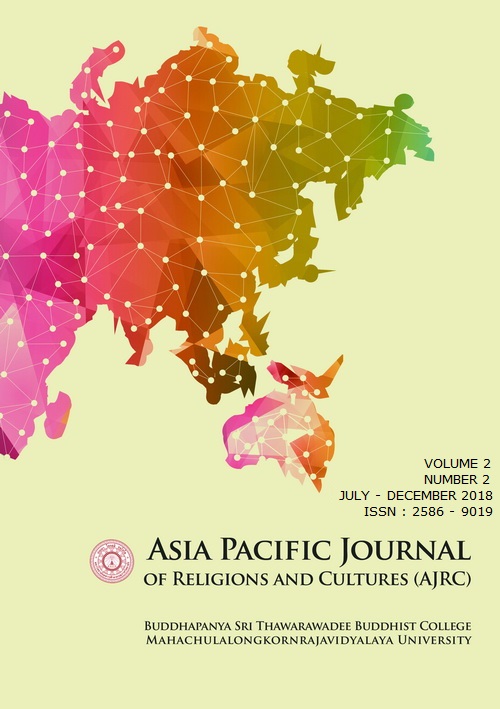Women Empowerment in Early Buddhism
Main Article Content
Abstract
Buddhism about twenty-five centuries ago inculcated the values of equality, justice and moral strength and spiritual energy by making woman empowered. The concept of women’s empowerment has gained more and more significance in the present times. The present study about women’s empowerment in the Buddhist period carries a contemporary significance. It offers the right path to remove ignorance and powerlessness among women. The right path is that of empowerment. Empowerment brings enlightenment. Enlightenment in the individual – both female and male – and social life enables humanity as a whole to tread the path of righteousness, truth, peace, progress, prosperity and justice. Empowerment of women mean empowerment of the entire mankind as in the present times, women are at the center of the world inside home and also hold the nucleus of the world outside home. Women have become the center that holds all the parts together and does not allow any disintegration to happen. The ceremony of innocence is celebrated by women, the flag of fair dealing is held by women, the march of non-violence is continued by women and therefore women have become the path finders of latest advances and record-breaking performance. Women have really proved themselves to be the solace for all the ills, all the pains, all the sorrows, all the sufferings and all the woes of men. In the woman lies the womb of progress, in her lies the cradle of prosperity, in her lies the hearth of peace and in her lies the throne of saintliness and she holds the key to happiness all over the world, peace in all the continents, brotherhood among all races and religious and woman will certainly in her reign of empowerment bring on this planet the Kingdom of Heaven.
Article Details
References
Davids Rhys. (1948). Psalms of the Sisters, Geoffrey Cumberlege.
Swami Mahadevananda Giri. (1947). Vedic Culture. Calcutta: University of Calcutta.
Ashok Humar Jha. (2004). Women in Panchayati Raj Institutions. Institution for Sustainable Development.
Blackstorn, Kathryn R. (2000). Women in the Footsteps of Buddha: Struggle for Liberation in the TherÊgÈthÈ, Delhi: Motilal Banarsidass Publishers Private Limited.
Cabezón, José, Ignacio. (1992). Buddhism, Sexuality, and Gender. Library of Congress Cataloging-in-Publication Data.
Dewaraja, Lorna. (1999). Buddhist Women in India and Pre-colonial Sri Lanka” in Karma Lekshe Tsomo, ed.. Buddhist Women Across Cultures: realizations. New York: University of New York Press.
Dhammananda, K. Sri. (1993). What Buddhist Believe. (5th Ed). Taiwan: The Corporate Body of the Buddha Educational Foundation.
Dixit, Shailini. (2008). Patriarchy and Feminine Space: A Study of Women in Early Buddhism. Delhi: Manak Publications.
Gross, Rita M. (1993). Buddhism After Patriarchy: A Feminist History, Analysis, and Reconstruction of Buddhism, New York: University of New York Press.
Conclusion Paper of International Conference on topic (2008). ‘Moving Towards Gender Sensitization of Trade Policy’, New Delhi.
Davids, C.A.F Rhys. (2000). Dialogues of the Buddha, part III. Delhi: Motilal Banarsidass Publishers Private Limited.
Devendrakumar Rajaram Patil. (1973). Cultural history from the Vāyu Purāna. Delhi: Motilal Banarsidass Publishers.
Hajira Kumar and Jaimon Varghese. (2005). Women’s Empowerment: Issues, Challenge & Strategies – A Source Book, (eds.). New Delhi: Regency. Publications.
José Ignacio Cabezón. (1992). Buddhism, Sexuality and Gender. Albany: State University of New York Press.
K. T. S. Sarao. (2010). Origin and nature of ancient Indian Buddhism. New Delhi: Munshiram Manoharlal Publishers.
Narasu, P. Lakshmi. (2005). The Essence of Buddhism. New Dehli: Asian Educational Services.
R.Venkata Ravi, V. Narayana Reddy and M. Venkataramana. (2004). Empowerment of People: Grassroots Strategies and Issues. (eds.). New Delhi: Kanishka Publishers.
Tsultrim Allione. (2000). Women of Wisdom. New York: Snow Lion
Publications.


